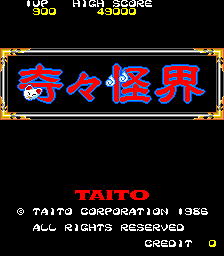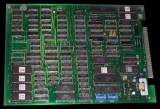
奇々怪界 © 1986 Taito Corp.
(KiKi KaiKai)
Priestess Sayo-chan must repel ghosts in order to rescue Seven Lucky Gods!
The Seven Lucky Gods have been kidnapped by giant ghosts. Armed with talismans and a purification rod, Sayo-Chan must travel to the ghost village and defeat the enemies who are determined to stop her rescuing the Gods.

Prom Stickers : A85
Main CPU : (2x) Zilog Z80 (@ 6 Mhz), Motorola M68705 (@ 2 Mhz)
Sound Chips : YM2203 (@ 3 Mhz)
Players : 2
Control : 8-way joystick
Buttons : 2
KiKi KaiKai was released in October 1986.
The title of this game translates from Japanese as 'Strange Old Story of Mystery World'.
The main character is actually a Shinto priestess (as is Miko from "Tengai"). Her main weapons are 'o-fuda', which are talismans that she shoots. She also has a purification rod that she uses to swipe at enemies up close.
A pirate version if known as "Knight Boy".
* Secret characters : when 'Game Over' screen appears, hold UP key until the screen change. The bear (kuma) and the valley (tani) should appear on the title screen. It means that this game have been developed by Taito Kumagaya (kuma + tani) Laboratory. And if you start the game when these characters are displayed, on life is added to your play (3 by default, the game should start with 4 lives).
* Wave a flag at a lamp post with a red orb inside it and you will get a powerup.
* There are several types of letters or messages :
White - increase range
Red - increse firepower
Yellow - big letters
* You can also pick up 'eggs' along the way. These eggs are activated by hitting fire & flag at the same time.
Blue - freezes all monsters for a given period of time, also those off screen.
Yellow - kill everything on screen.
* The 'gremlins' don't kill you but they slow you down. You can lose them by running around a lamppost.
1. KiKi KaiKai (1986, Arcade)
2. Kiki KaiKai - Nazo no Kuro Manteau [Model SHVC-KK] (1992, Super Famicom)
3. Kiki KaiKai - Tsukiyo Soushi [Model SHVC-3N] (1994, Super Famicom)
4. Kiki KaiKai Advance [Model AGB-AKIJ-JPN] (2001, GBA)
Author : Hisaya Yabusaki
Programmer : Kazutomo Ishida, Daisuke Sasaki
Character Designer : Nenko Nishimura, Kazuya Mikata
Sound Effector : Naoto Yagishita
Music Composer : Hisayoshi Ogura
Director : Mikio Hatano
CONSOLES:
Nintendo Famicom Disk System (aug.28, 1987) "Kiki KaiKai - Dotou Hen [Model TFD-KIK]"
NEC PC-Engine (mar.27, 1990) "KiKi KaiKai [Model TP02009]"
Sony PS2 (jul.28, 2005) "Taito Memories Joukan [Model SLPM-66057]"
Sony PlayStation 2 (mar.30, 2006) "Taito Legends 2 [Model SLES-53852]"
Microsoft XBOX (mar.31, 2006) "Taito Legends 2"
Sony PS2 (mar.31, 2006) "Taito Legends 2 [Model SLES-53852]"
Sony PS2 (may.16, 2007) "Taito Legends 2 [Model SLUS-21349]"
Sony PS4 [PSN] (jul.15, 2016) "Arcade Archives - KiKi KaiKai [Model CUSA-03709]"
Sony PlayStation 4 [PSN] (sept.14, 2016) "Arcade Archives - KiKi KaiKai [Model CUSA-03721]"
HANDHELDS:
Sony PSP [AS] (jan.3, 2006) "Taito Memories Pocket [Model UCAS-40040]"
Sony PSP (jan.5, 2006) "Taito Memories Pocket [Model ULJM-05076]"
Sony PSP  (feb.10, 2006) "Taito Memories Pocket"
(feb.10, 2006) "Taito Memories Pocket"
Sony PSP (oct.6, 2006) "Taito Legends Power-Up [Model ULES-00473]"
Sony PSP (nov.9, 2006) "Taito Legends Power-Up [Model ULES-00473]"
Sony PSP (may.17, 2007) "Taito Legends Power-Up [Model ULUS-10208]"
COMPUTERS:
PC [MS Windows, CD-ROM] (mar.31, 2006) "Taito Legends 2"
PC [MS Windows, CD-ROM] (jul.10, 2007) "Taito Legends 2"
MSX (feb.10, 1987)
Game's ROM.